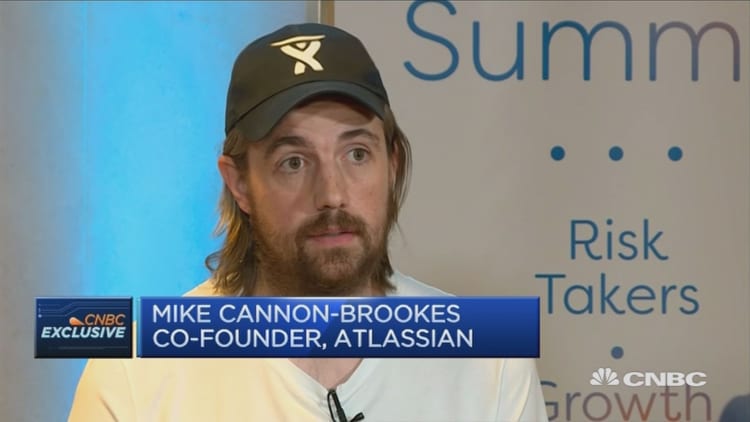When founders agree to sell their companies to larger entities, the resulting conversations can be stressful, or even antagonistic. Sellers generally want to be sure about when they and their employees will receive money. Buyers inherently have more power and don't always provide the most favorable terms.
Enterprise software company Atlassian wants to stand out from the others in a hot deal market. On Monday, it published its term sheet document for acquisitions, which spells out how much money it will set aside for escrow and for how long.
The move reflects how competitive technology companies can be when it comes to sucking up new talent and technology. It could help Atlassian — which competes with other big acquirers in the enterprise tech space like IBM, Microsoft and Salesforce — look like a better destination for founders who are ready to sell, and that could help the company win good assets more often.
Established in 2002, Atlassian has spent over $1 billion to acquire more than 20 companies. Beyond taking direct acquisition experience into consideration, executives also reviewed data on hundreds of deals and decided on terms that were specifically designed to be more accommodating to the companies getting bought.
There are two phases to deal discussions: negotiating terms and agreeing on an integration plan, Atlassian chief legal officer Tom Kennedy said last week.
Many advisors get involved in the first part and don't necessarily care about how things work out with the second, but Atlassian's people do, Kennedy said. They're the ones who have to deal with how founders feel long after deals get announced, and they want to make sure founders are happier with the whole process.
"This is not driven at all by any of our experiences. It's not a reaction to something going wrong. The process sucks, and it needs to be improved, and we're going to try to do that," said Kennedy, who has been at Atlassian since 2011, four years before the company went public.
After reviewing the data, Kennedy and his colleagues found that the median escrow for a software deal is 10% of the price of the acquired company and can even reach 20%. Atlassian will insist on a 5% escrow, or as low as 1% with an insurance policy.
Plus, Atlassian wants to hold back money for a shorter period of time. The company will keep money in escrow for 15 months, while the median period for deals that get executive reviews is 18 months. And the company won't go after founders about intellectual property or privacy issues that arise after the escrow period ends.
Earlier this month, Chris Hecht, Atlassian's head of corporate development, said an entrepreneur who had recently sold his company told him that at least 40% of its legal time and expenses was devoted to dealing with intellectual property and privacy.
Atlassian wants to do what it can to mitigate that portion of deal-making, said Hecht, who previously worked at Salesforce.
In the past, organizations like the nonprofit National Venture Capital Association and the Silicon Valley start-up accelerator Y Combinator have released term sheet templates for start-ups taking on equity investments. Hecht hopes the Atlassian document can create a similar industry standard for acquisitions.
The document applies to purchases of private companies; Atlassian has not acquired any publicly traded companies.
"Will it drive greater shareholder returns? It won't hurt at all," Kennedy said.
Atlassian's stock has risen 95% in the past year.
WATCH: Atlassian's Cannon-Brookes on Trump, Silicon Valley and diversity



